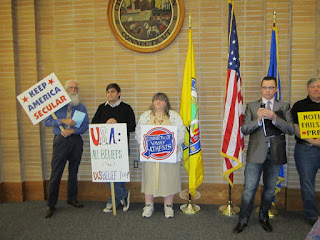Catholic blogger Matthew Archbold recently wrote a post titled “Atheism is the Uncoolest Choice Ever, and I Can Prove It.” What struck me, in reading through his piece, is a series of specific assumptions. Take this, for instance:
4) This is an extreme Christian.
This is an extreme atheist:
See the difference?
Mother Theresa believed that suffering and poverty were beautiful, and reportedly denied patients in her care access to pain medicines or other interventions that would have increased their comfort. She’s not the person I’d pick as a positive example of a Christian who lived a life of selfless service. In addition, many atheists are extremely critical of Dawkins, something Archbold seems not to know. More to the point, why does Archbold think it makes sense to compare an atheist professor with a Catholic humanitarian? Why not compare two professors, or two humanitarians?
But there’s perhaps an even more important point to make: Many people who don’t believe in God also don’t give a whit about atheist figureheads. Atheism is not a church, with members and theology and an authority structure. It’s not a belief system, and it has no dogma. There are conservative atheists and progressive atheists, anti-abortion atheists and pro-choice atheists, feminist atheists and misogynist atheists—the list goes on and on.
There’s an assumption here that those who do not believe in the supernatural replace church with some sort of organized atheist activities. You can see that here:
6) Typical Atheist gathering:
World Youth Day:
See the difference?
The idea that that is a fair comparison is bizarre. For one thing, it’s a highly selective choice of images—the protesting atheists should be compared to pro-life protestors, not a worldwide meeting between youth and the pope, featuring live music and a festival atmosphere. For another thing, most individuals who do not believe in God aren’t replacing God-time with organized-atheist-time. Instead they’re replacing it with family-time. Or community-time. Or friend-time, or outdoor activities, or visiting museums, or playing board games, or—well, the list goes on forever.
Those who are actively religious, with a full schedule of church, youth group, and other church-related activities may have a hard time seeing past their experience to understand what life might look like without those things. I’m sure I couldn’t have imagined it myself at one point, during my many years as an evangelical. And yet, here I am. I take my daughter to Girl Scouts. I volunteer at my kids’ school. I have friends and neighbors over for cookouts. I garden. I campaign for local political. I take my kids to the library. I stop and talk with other parents dropping their kids off at school.
Not believing in God does not mean you lose all sense of community, or that you replace religious community with overtly atheist community. Far from it. While some atheists do become involved in organized atheism, this involvement is often little different from other forms of activism, political, community, or otherwise. We all choose causes we are passionate about, whether it be women’s issues, immigrants’ rights, poverty alleviation—or defending the separation of church and state. In other words, even organized atheism is not about replacing religion.
One last thing. Note this part here:
1) Atheists have less children and that probably means…well you probably know what that means since you’re all about SCIENCE! Once again, to sum up, you’ll be miserable, have a shorter life, and quite likely less sex than your religious counterparts. And you thought atheism was cool? Reconsider and repent ye’ fools. Jesus said he is the way, the truth, and the life. Left unsaid, is that He’s totally cooler than Richard Dawkins!
This is a very serious whole to part fallacy. Even were Archbold’s claims here are true—and his claim that atheists have less sex seriously needs a citation—there is some serious confusion of correlation and causation going on here. Being an atheist won’t make you have fewer children, because—surprise!—how many children you have is up to you! (Well, and your partner, but you get the idea.) Being an atheist does not shrivel your ovaries (or testicles). Sure, religions frequently pressure their adherents to have children, but there’s nothing stopping individual atheists from having children.
What’s missing is an understanding that atheism offers people choice. You want to have three or four children? Guess what, you can! You want to have no children? Guess what, you can? You want to spend your weekends hiking? Have at it! You want to spend your weekends gaming? You can! You want to focus your energy on environmental activism? Go to town! You want to work with local immigrant outreach groups? Be my guest! You want to go to a rock concert, have sex with your boyfriend, get a tattoo? By all means! You prefer the symphony, enjoy being single, and memorize poetry in your spare time? You go girl!
I’m not saying that religion (in this case Catholicism) brings all end to choice. It doesn’t. You still choose your passions, your interests, your areas of activism—but generally within certain boundaries. There are pressures exerted by your religious community—pressure to attend church and reconciliation, pressure to remain abstinent until marriage, pressure to oppose abortion and gay marriage. And depending on the sect, pressure to not drink, to not wear certain clothes, to not listen to certain kinds of music, and so forth.
Archbold presents a contrast between two sects—one, he suggests, with stellar role models and events, the other with crappy role models and events—when in fact the actual contrast is between joining a community with specific rules and norms, on the one hand, and being able to more freely follow your interests and create your own communities and social circles, on the other.
To be sure, some, like Archbold, prefer joining a ready-made community with its own rules and norms to creating their own communities. That’s understandable! This decision, however, should not be backed up with stereotypes and falsehoods about the alternative like those bandied about in Archbold’s article.
Or has the Catholic Church exited the eighth commandment?



















